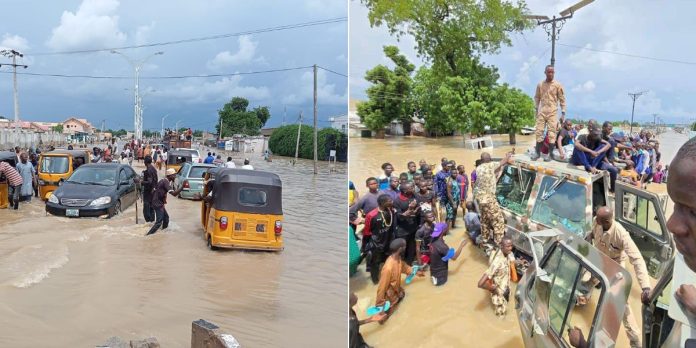The severe flooding which ravaged Maiduguri, the Borno State capital has claimed at least 30 lives, affected one million persons and displaced 414,000 others.
NEMA spokesman Manzo Ezekiel on Wednesday said that the death toll had hit 30 and displaced persons close to half a million.
According to NEMA, more than 23,000 households have been hit by the rapid rise of waters following the weekend rupture of the Alau dam on the Ngadda River, 20km south of Maiduguri.
Reports indicate the water had receded as of Wednesday after 70 per cent of Maiduguri was submerged by the fast-moving waters, according to NEMA, which ravaged major city locations, including the palace of the Shehu of Borno, Umar Ibn Garbai El-Kanemi; the state secretariat, post office, cemetery, and the University of Maiduguri Teaching Hospital.
The flood also washed away 80 per cent of animals at the Sanda Kyarimi Park zoo, and damaged houses, schools, as well as commercial and worship centres.
1m affected – Zulum
Borno State governor, Prof. Babagana Umara Zulum, said about one million people were affected by the flood.
The governor disclosed this to newsmen yesterday while distributing cash and cooked food to displaced persons taking refuge in Bakassi Camp in Maiduguri.
Governor Zulum said the full extent of the damage has yet to be determined but added that a rescue team has been deployed to affected areas to assess the losses in lives and property.
He also said a health emergency committee had been constituted to address potential outbreaks of flood-related diseases in Maiduguri and Jere.
The governor expressed concern about the spread of waterborne illnesses due to the flooding of sewage systems but assured that efforts are being made to mitigate the situation.
He said: “You can see how water completely flooded the area, sewages were completely flooded, that means waterborne diseases would be transmitted but In sha Allah we should get over it.
“As of now, we are yet to ascertain the extent of damage, but about one-fourth of the entire Maiduguri is flooded with water”, he said.
FG intervenes
President Bola Tinubu expressed deep concerns over the flooding and tasked relevant government agencies to expedite rescue efforts while Vice President Kashim Shettima arrived in the Borno capital Tuesday to conduct an on-the-ground assessment of the devastating floods.
Tinubu also called for the immediate evacuation of residents in communities overtaken by floods.
The Governor of Borno State, Babagana Zulum, told journalists that a preliminary assessment conducted by the government showed that more than a third of Maiduguri was flooded, which affected an estimated one million people following the heavy flooding.
“The floods covered one-third of the city, affecting over one million people. It is very devastating,” Zulum said while distributing cash and food to thousands of displaced persons at a camp.
Zulu added that the Federal Government allocated N3bn for rehabilitation of the victims, adding that the funds would be used to provide food and other essential supplies, as well as support long-term strategies, including health monitoring to prevent disease outbreaks.
The governor also announced that cash distributions of N10,000 per household have been made to flood victims.
In addition, the state government organised search and rescue operations to assess casualties and gather data on those affected.
“We are distributing money and food to head of each of the families as a temporary measure to cushion the impact,” he said.
Luckily for us, we just received N3bn flood intervention fund from the Federal Government. So, we are using part of this fund to provide immediate support to the communities affected by the flood.
“We have separated them into different camps and already providing support. We will come up with long-term and short-term measures as soon as we take the data of the people affected.”
Victims ordeal
Despite efforts by the FG and the state government to evacuate victims of flood to IDP camps, some victims slept on roads following the disaster.
The victims, comprising children and women around Al-ansar Mosque along the Polo Road, told our correspondent they preferred the roads than going to the IDP camp.
One of the flood victims, Hassana Shaibu, a mother of four children, said they slept under a tree close to the road on Wednesday because she got the news of the IDP camp late and could not locate the place.
“I got the news that people can go to the IDP camp at the late hour, and I couldn’t move around at night with my children. So, since this place is close to the mosque and there is light, me and my friend, who has two children, decided to pass the night here,” Shaibu said.
Another victim, Salisu Fatti, added, “I heard stories of how camps used to be. Its better I stay here that I am sure is safe. Hopefully, tomorrow (today) before evening, I will go back to Modugari, where my house is. There’s the possibility the water must have subside.
A Red Cross official Abass Mohammed narrated how a family of a resident of Custom area sailed through the flood to a flyover for safety.
The man, identified as Abacha, carried two of his children while his wife had a child as they all scampered through the raging flood to the bridge.
“He (Abacha) was sure that no matter how high the flood got, it won’t overflow the bridge. It’s obvious he had lost his property but grateful that none of his kids were swept by the flood,” Mohammed said.
Bayelsa affected
Several neighbourhoods were submerged as rains continued from Tuesday to Wednesday in Yenagoa, the Bayelsa State capital.
Cemetery, Azikoro, Ekeki, Okaka, Swali, Kpansia, Amarata and Ovom were some areas seriously affected by the floods.
The rains in Yenagoa contributed to the continued rise of the water levels in the adjoining Epie Creek and River Nun, indicating that the flood could be damaging.
The FG had warned of the danger posed by rising water levels. The Nigeria Meteorological Agency had predicted heavy rain and thunderstorms in many states between Wednesday and Friday.
The prediction came as NEMA and the military continued to battle the heavy flooding in Maiduguri.
In Bayelsa, a flood-prone state lying six feet below sea level, the situation was worsened by poor town planning, inadequate drainage, and construction on natural water courses, among other factors.
In some neighbourhoods such as Amarata and Ekeki, residents resorted to using buckets and basins to keep the water out of their homes, while some had their property destroyed.
Recounting his ordeal, an environmentalist, Alagoa Morris, said his home and offices were flooded.
A resident of Amarata, Nathan, said he returned home from work on Tuesday only to find his wife and seven-year-old son battling to bail water from their house.
“There was no place to sleep. The water forced everyone to seek refuge, but like the captain of the RMS Titanic, I refused to abandon the ship,” he said.
In another development, the Benue State Government raised the alarm about the invasion of snakes in some of the IDP camps across the state.
The Executive Secretary of the State Emergency Management Agency, James Iorpuu, who raised the alarm during the distribution of relief materials to IDPs in the state on Wednesday, said 15 displaced persons had been treated in recent times.
“In recent months, Benue-SEMA has faced the tragic challenge of snake bites among our IDP populations. I am pleased to report that we have successfully treated over 15 cases across various camps, thanks to the swift action of our health teams and the support from our partners,” he said.
He added that to curtail the occurrence of snake bites in the camps, the agency had fumigated all the camps.
The SEMA boss stated that the World Bank would soon commence the construction of 50 units of shelter in Nyihemba in Kwande Local Government Area of the state, adding that the agency would soon begin IDP farm projects in Kwande, Logo and Gwer-West Local Government Areas.
Meanwhile, the Kebbi State Governor, Dr Nasir Idris, has commiserated with his Borno State counterpart, Prof Babagana Zulum and the people of the state over the devastating flood in the state.
“It’s with sympathetic feeling that critical government institutions such as the Government House, Teaching Hospital, Shehu of Borno’s Palace, secretariat, schools and business centres were reported to have been affected,” Idris said in a statement signed by his Special Adviser on Communication and Strategy, Abdullahi Zuru, on Wednesday.
“Although we in Kebbi have experienced a similar unfortunate incident, we share your grief, and we are deeply pained by the natural disaster.”





